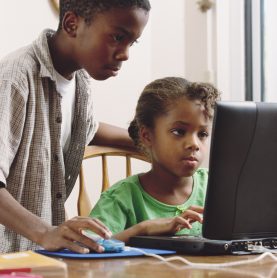1-26-21
Children are spending more time now than ever with technology as they learn from home under California’s COVID-19 safety protocols.
Even before the pandemic, child development experts warned of the side effects of too much screen time on children. But parents are now faced with balancing virtual learning, working from home, and their child’s desire to watch TV and play video games. Child Care Resource Center is committed to helping families navigate these emerging challenges.
Existing wisdom from the American Academy of Pediatrics advises a one to two hours of screen time for children over age 2 and no screen younger children. Now, as children spend a majority of the school day in front of a screen, experts are highlighting the importance of counteracting screen time with physical and creative play.
“Kids need to decompress after screen time to alleviate frustration and process what they’ve seen and learned,” Dr. Alma Cortes, an early childhood development professor and CCRC board member, said.
Alma, who has studied early childhood development for over 15 years, says increased screen time can be emotionally exhausting for children faced with processing a lot of new information. She also said longer stretches of screen time can promote aggressive behavior among younger children and may hinder their ability to focus.
“Children at that age don’t really know their own boundaries, they’re still learning those social boundaries,” Alma said. “If they’re watching shows that they don’t understand fully, maybe shows where superheroes fight villains, they may not understand that by acting that out towards others they are acting aggressively.”
An article shared by Zero to Three, an organization focused on improving early childhood development, advises parents to watch TV shows with their children to help them understand what they’re seeing.
“Answer children’s questions,” the article states. “Children are still figuring out new ideas and concepts. Sometimes they need your help to make sense of what they’re seeing on the screen.”
A mother herself, Alma says it can be difficult to watch everything your child watches while also working from home. So outside of the screen time required for remote learning, Alma suggests limiting TV and computer time to certain days of the week. For instance, setting boundaries for your children that only permit an hour of screen time on Wednesdays, Fridays and Sundays.
But, as Alma and the experts at Zero to Three recognize, it’s not always possible for working parents to reduce screen time. If that’s the case, focusing on the quality of programming can have a big impact.
“Research has found that some children’s shows (such as Arthur, Clifford, Dragon Tales, Dora the Explorer, and Blue’s Clues) have positive effects on children’s learning, but other shows (like Teletubbies or Barney & Friends) do not,” an article shared by Zero to Three states. “In general, it’s best to choose age-appropriate programs in which television characters occasionally speak directly to children and television characters ask children to participate in the show in some way (e.g., repeating a word). Children’s shows with a strong storyline and storybook structure (beginning, middle, end) are also good.”
According to Zero to Three, it’s important that children do not watch TV or view other screens as to go to sleep. Children may develop issues falling asleep on their own and may stay up later when they have access to a screen.
Alma says allowing children to play on their own is important for their development and becoming independent. She adds that play time can be a way to sharpen your child’s talents.
“It’s important to capitalize on your child’s strengths – where can you use them during the week,” Alma said. “If your child is a strong writer, get them to journal. If your child is good at art, this is your art time. Focus on the creative and play experiences and schedule it in to the day. Celebrate that time.”
For more tips on limiting screen time or improving the quality of content your child consumes, click here.


